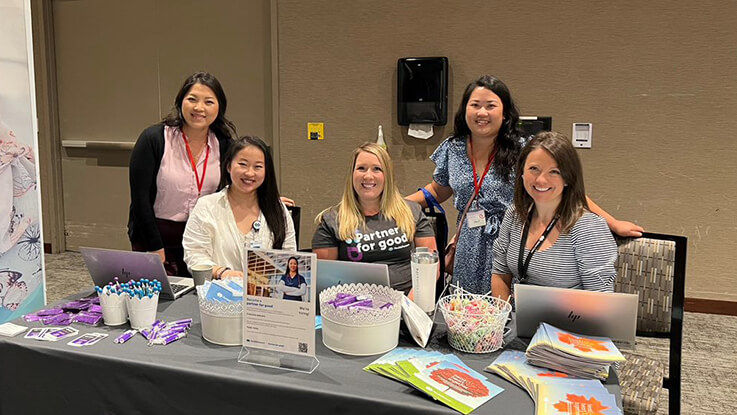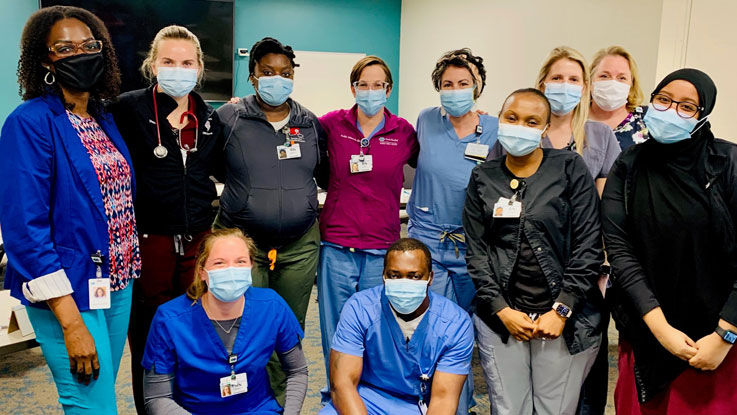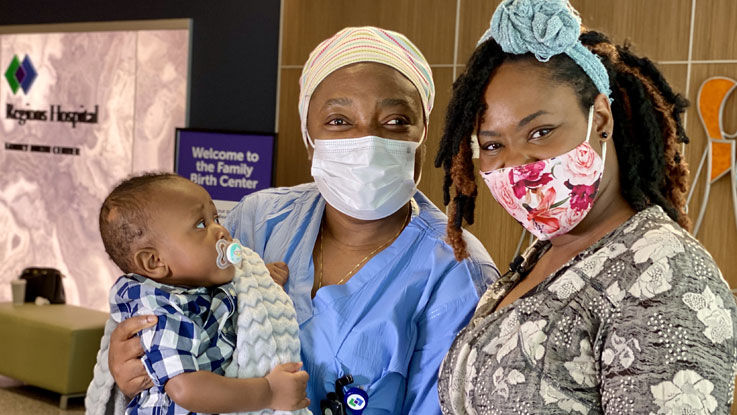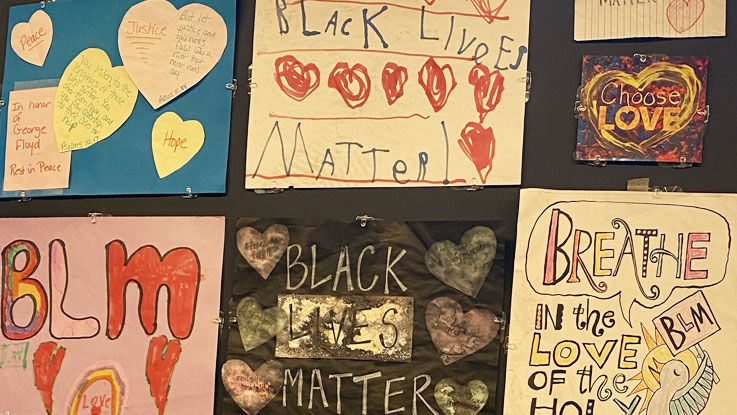A culture where every person is welcome, included and valued
As an organization dedicated to the health and well-being of every person, we’re committed to the responsibility we all share to build a stronger workplace and community. Throughout our history, we’ve been passionate about serving all in our increasingly diverse population. Inequities in care and coverage harm health, significantly and without question. But inequities persist. We continue to deepen our commitment to this work – because it’s critical to our mission and the right thing to do so that everyone may feel welcome, included and valued.

Recruiting a diverse workforce
In 2022, we welcomed more than 6,500 new colleagues to our organization, of which 36% were people of color. With continued limitations on in-person meetings and gatherings, our recruiters got creative with hiring events.
Recruiters hosted virtual career fairs, which made it easier to connect with more candidates. We also sponsored and hosted a table at the Hmong Nurses Association National Conference to share information about jobs at HealthPartners.
Through mentorship programs, internships and clinical rotations, we create opportunities for students to learn more about careers and gain hands-on experience. Examples include our hospitals and clinics partnering with high schools, local colleges and universities for clinical rotations and internships and our participation in the 30,000 feet Tech Geek intern program by hiring three diverse students as interns in our IT department.

Clinical simulation brings anti-racism training to the bedside
When an emergency room technician at Regions Hospital was the target of racial slurs from a patient, and her colleagues present didn’t speak up, what was hurtful in the moment turned into something bigger – an opportunity to focus on anti-racism in the workplace.
A team of colleagues from Clinical Simulation, Diversity & Inclusion and Nursing Education worked with our colleague to develop a training based on her own experience. In a way, teams and colleagues who participate re-live the events she experienced.
During the 25-minute simulation session, a patient (in this case, a mannequin) makes racist remarks to an incoming nurse. Then, the colleague participants — acting as the outgoing nurses — decide how to respond and what to do next.
Leaders from the Clinical Simulation and Diversity & Inclusion teams facilitate a dialogue to debrief.
Colleagues who’ve participated in the simulation agree that the training was a valuable experience. According to one participant: "It was very uncomfortable but a very good simulation and discussion. Change doesn't happen without getting uncomfortable, so I found it very helpful and insightful."
More than 700 colleagues have participated since the first Diversity, Equity & Inclusion simulation in March 2021.

Centering health equity in birth center experiences
In 2021, we partnered with consulting agency Heart of the Customer to improve outcomes for our Black patients by documenting their pregnancy experiences. The goal was to build empathy, undermine systemic racism and improve outcomes. As part of that project, we followed and documented each step along the path of pregnancy, from the time a patient learns they’re expecting through delivery and postpartum. Then we used the data to help us improve and provide patient-centered care.
The result: the birth of two new virtual group classes focused on supporting Black women through their prenatal and postpartum journeys. Community Circles virtual group classes focus on shared community and experiences. The circle is made for and driven by its members, who are guided by discussion topics. Expecting Together virtual group classes are guided by one of our OB-GYN physicians. Together, participants learn about the medical care that happens throughout each stage of their pregnancy.
Since launching in mid-2022, we’ve hosted 18 Community Circles groups. Feedback from participants has included that their “experiences and personhood were validated” and they “appreciate circles as a bridge to community resources.”
Connecting members with doulas
HealthPartners is committed to expanding access to doula services for members and patients. Birth doulas are non-medical professionals who provide informational, emotional and physical support during pregnancy and childbirth. Some studies show that patients who use doulas have improved outcomes for themselves and their babies, including shorter labors, fewer C-sections, fewer low birthweight babies and higher breastfeeding rates.
Doulas can be especially beneficial for our members and patients of color in our effort to close health care disparity gaps. To increase awareness of how doulas can provide pregnancy support, we created a video explaining what a doula is, the value they bring to the birth experience and how members can connect with a doula. The video has been translated with subtitles into
Incorporating inclusive language into everyday interactions
Using gender inclusive language and chosen pronouns is an especially important way to show support for people who are transgender – it can even save lives. According to a survey from the Trevor Project, trans youth were half as likely to consider suicide when their chosen pronouns were used.
In 2022, HealthPartners introduced a new option for patients to enter their sexual orientation and gender identity (SOGI) information via mobile check-in and in their online myChart account. Patients can update their preferred name, gender identity, sex assigned at birth and sexual orientation.
A recent upgrade to our electronic medical record system removed legal sex from all wristbands, visit labels, registration labels and lab labels. We also created templates for colleagues to add pronouns to email signatures to minimize misgendering and normalize conversations around gender and identity.
Podcast explores diversity, equity, inclusion and anti-racism
On the show, the doctors host candid conversations with guests on topics such as equity and education in the community, microaggressions, cultural humility, the importance of trust in health care, and what it means to be an anti-racist. Now in its fourth season, guests have included clinicians, leaders and people in communities making a difference in advancing diversity, equity and inclusion.
“There’s something everyone can take away from the guests and topics. I’ve found myself scribbling notes a lot when we’ve recorded. There have been so many things I’ve learned and want to apply to my everyday life. I hope the audience feels that way, too.”
Off the Charts is available on

George Floyd Global Memorial art exhibit
As part of our commitment to creating spaces where everyone feels welcome, included and valued, Park Nicollet Methodist Hospital hosted the George Floyd Memorial Art Exhibit, “I Am Not You. You Are Not Me. Healing Begins with Acceptance.”
Showcased were more than 100 pieces of art and offerings left at George Floyd Square near the intersection of East 38th Street and Chicago Avenue South in Minneapolis by people from around the world. The collective and individual expressions of pain and hope were displayed for two months at the start of 2023.
The exhibit was made possible by the partnership of the George Floyd Global Memorial and Park Nicollet Foundation.